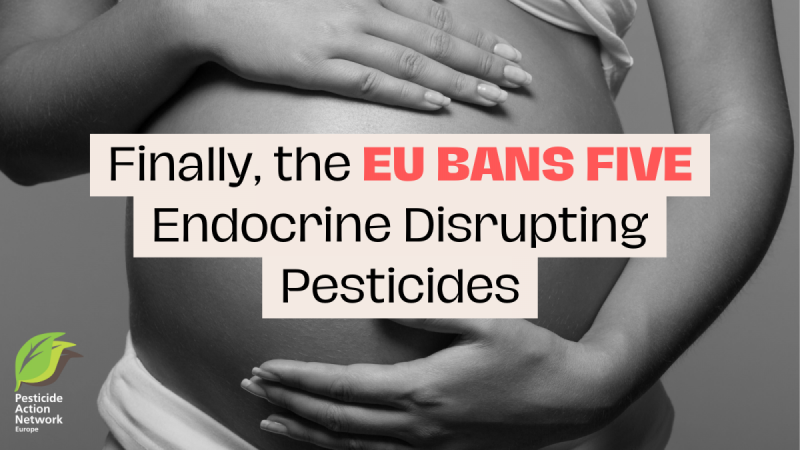Glyphosate was not the only topic in the EU SCoPAFF committee last week. Five dangerous chemicals were finally banned and one new one is not allowed. The groundwater polluting herbicide s-metolachlor and 4 endocrine disruptors will disappear from our fields and plates. Finally, after doing their destructive work to health and environment for many years. A fifth one will not be used.
Salomé Roynel, Policy Officer on Pesticide Risk Assessment, welcomes the urgent ban on endocrine disrupting pesticides: “We and many partner organisations have been campaigning for many years to ban these very dangerous chemicals. They can have a devastating effect on the unborn and young children in very low concentrations. This ban comes 5 years after the criteria went into force and 10 years after the introduction of the regulation. So it is high time this action was taken. Now we expect all pesticides in this category to be banned soon.”
Pesticide residues on food is the main source of endocrine disrupting chemicals exposure for humans. These chemicals alter the function of our hormonal system and can have adverse effects at a very low dose, particularly when exposure takes place during early life. Young children and pregnant women are especially vulnerable and therefore the ones at higher risk. See for more explanation our page on this topic.
The hormone disrupting substance asulam sodium was not approved and the approvals of metiram, benthiavalicarb, clofentezine and triflusulfuron-methyl will not be renewed.
Ban on herbicide s-metolachlor
Another positive point is the ban of S-metolachlor. This herbicide was until recently widely used in maize cultivation for animal feed. This substance and its metabolites are found to contaminate groundwater. For the metabolites (breakdown products) there are concerns or data gaps in relation to genotoxicity and carcinogenicity. S-metolachlor is also posing a high risk to earthworm-eating mammals. So it was evident that the substance does not meet the requirements for approval and we fully agree with the proposal to ban it. First France decided to ban it after an effective campaign by our member Générations Futures and partners, next an EU wide ban was proposed.
Grace period contradicts EU law
However, we express criticism regarding the transition and grace periods stipulated in the ban decision. These grace periods allow the ban to become effective in November 2024 for s-metolachlor and benthiavalicarb, and in January 2024 for metiram. This contradicts the regulation that demands the swift removal from the market of substances when they are banned for health or environmental reasons. The substances have already been allowed on the market for many years . The ban should have become effective immediately.
Many more to go
However, discussions on other very dangerous pesticides are far from positive as their use will still be allowed on the market according to proposals by the Commission. PAN Europe sent an expert letter to the committee members to deliver clear evidence why many other pesticides on the agenda do not meet the criteria to be on the market and need to be banned. We also explained why certain practices are not in line with EU law, shown by recent opinions by the EU Court of Justice. These Important developments are urgent to reduce the use of pesticides, especially the most harmful ones. See for more information our blog and letter.
